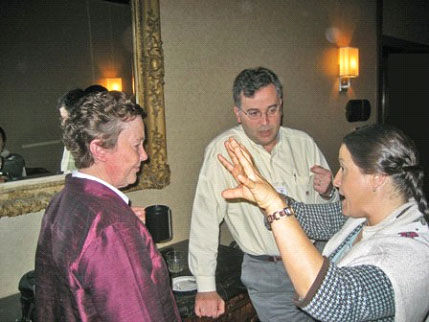2008 PTEC Conference: "Master Teachers: Change Agents for Teacher Preparation"
Teacher Preparation Section
American Physical Society. Reprinted from PhysTEC News, Volume 1, Spring 2008.

Helen Quinn (Stanford Linear Accelerator Center, APS Past President), Stamatis Vokos (Seattle Pacific University), and Valerie Otero (University of Colorado at Boulder) have an animated discussion between conference sessions. Photo by Ted Hodapp.
The 2008 Conference on the Preparation of Physics and Physical Science Teachers was held in Austin, Texas on February 29th and March 1st. For the second straight year, the conference attracted a capacity crowd of around 120 physics and education faculty, administrators, K-12 teachers, and students, who soaked up two packed days of 90-minute workshops given by national experts on master teachers, assessment and evaluation, curriculum and teaching methods, and institutional partnerships.
Among the best-attended sessions were Ed Prather’s workshop on interactive pedagogy,
"Are you really teaching if no one is learning?" and Bob Beichner’s workshop on his "Student Centered Activities for Large Enrollment Undergraduate Program (SCALE-UP)." Also very popular was a full-day workshop at the University of Texas at Austin on UTeach, one of the best-known and most successful math and science teacher preparation programs, which is now being replicated at twelve universities around the country through grants from the National Math and Science Initiative (NMSI).
Along with the workshops and plenary sessions, the conference provided an opportunity for members of the physics education community to connect with colleagues in other disciplines and with university administrators. Representatives from NASULGC (the National Association of State Universities and Land-Grant Colleges) the American Chemical Society, and Math for America led workshops and organized planning sessions for future multi-disciplinary initiatives in science and math teacher education.
Attendees provided overwhelmingly positive feedback on the program, and many told us that the Conference’s compact size and intense focus created a particularly rich environment for teaching, learning, and networking. Valerie Otero, a University of Colorado Education Professor, remarked on the collegial atmosphere—"there were no ‘knowers,’ only learners. The problem of preparing qualified physics teachers is so hard that everyone is looking for someone who knows the answer."
To build on the conference’s success, project leadership plans to continue seeking out ways to engage physics departments and institutions in teacher education. The 2009 PTEC Conference, with the theme "Institutional Change," will take place in Pittsburgh on March 13th and 14th, preceding the APS March Meeting. Project leader Ted Hodapp says, "At a time when policy makers are requiring more students to take physics in our nation’s already understaffed classrooms, it is critical that we turn the excitement and momentum from the PTEC Conference into action, and results."
Gabriel Popkin (popkin@aps.org) works on education projects for the American Physical Society. He graduated in 2003 with a B.A. in physics from Wesleyan University.
